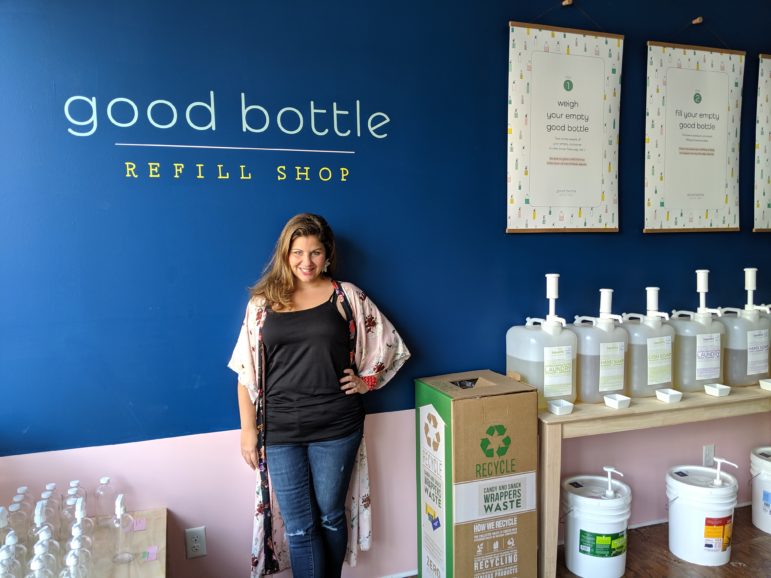
Many people think that most plastic is recyclable, but 79 percent of all the plastic ever made has ended up becoming waste. As a result, 18 billion pounds of plastic waste enter the world’s oceans from polluted coasts each year.
As of Friday, the very uphill battle against all this waste has a new frontier: New Jersey’s very first bottle refill shop, a place where customers can bring a container and fill it up with bulk household products and pay by weight.
Such shops have popped up around the country – and indeed, the very concept of bulk shopping has long existed in co-ops and grocery stores such as Whole Foods – but Deanna Taylor-Heacock said the Good Bottle Refill Shop in Maplewood will fill a gap here that she discovered while seeking out a more zero-waste lifestyle. Bulk food shopping is easy to find, but very few shops have refill stations with an extensive collection of household products.
“I felt like I could use one hard plastic bottle of Gain my entire life, but I’m buying one each month,” Taylor-Heacock told the Village Green days before the launch of the store, which is part of the General Store Coop’s new flagship location on Springfield Avenue.
The store is stocked with numerous products, including hand soap, laundry detergent, dish gel, shampoo, natural hair products, lotion, toilet cleaner, air freshener, massage oil, bath salt, shea nut butter, and even dog shampoo. Taylor-Heacock researched and tested the products to ensure that she was carrying brands that are environmentally friendly and effective.
Although she has become very concerned about plastic waste, Taylor-Heacock said her journey began primarily out of concern for her budget. She was constantly going to retail stores to pick up something she needed, and in the process, picking up things she didn’t need. A more disciplined approach to buying, including bulk purchasing when possible, helped her family save $10,000 last year compared to the year prior.
“I felt like I was just going from store to store and I hated it,” she said. “I would basically fill my cart and think, ‘I am buying my trash. Everything in here is going to be thrown away.’”
Good Bottle comes as momentum for reusable containers grows. Even mainstream companies are looking at ways to reduce plastic waste and testing reusable options. Nestlé has set a goal of making 100 percent of its packaging recyclable or reusable by 2025. Walmart has laid out a zero-waste vision and is working with its operators to reduce disposable packaging.
And another New Jersey company, Trenton-based TerraCycle, is behind an effort with P&G, Unilever and other major companies to marry refillable containers and home delivery. Loop customers can order products such as Tide laundry detergent, Pantene shampoo and Häagen Dazs ice cream to be delivered in glass and steel containers to their house. Empty containers are picked up and refilled by the service, which is currently available in nine states, including New York and New Jersey, as well as Washington, D.C.
“The real issue isn’t just plastic – it is the concept of disposability and the ‘take, make, waste’ mentality,” Michael Waas, global vice president of brand partnerships at TerraCycle, told the Village Green. “Truly solving the waste crisis requires designing new, circular systems.”
While the company is not releasing sales figures yet, Waas said they have seen “a major increase in the number of people and companies participating in our programs over the last year.”
The impact such efforts make is immediate, if initially small. During a soft launch preceding its Friday opening, Good Bottle saved customers from buying 154 plastic bottles – and Taylor-Heacock is continuing to add to that number each day.
She hopes that customers will be drawn to a local option where they can come in, take as much of whatever product they need, and return when they need more. She is also curating innovative eco-friendly products such as portable reusable cutlery, a towel roll for reusable napkins and silicon replacements for zip-top bags that people may not know exist.
Her biggest challenge is competing with big-box retailers on cost. Even though she is purchasing products in bulk, she has to keep larger margins as a small business than companies such as Amazon.com’s Whole Foods that operate at a much bigger scale.
What she offers in return is flexibility: Customers are welcome to bring in their own containers, however small, and test tiny amounts of products before making larger purchases. And as a local business owner, she is available on hand to offer tips such as which products can be diluted with water to help them stretch – to save customers money and get them in the mindset of using less stuff.
“You use one ounce instead of a whole cupful,” she said. “It’s a different mindset.”
This story was produced in collaboration with the New Jersey Sustainability Reporting Hub project. It was originally reported by Ambreen Ali for VillageGreenNJ.com, and may be re-distributed through the Creative Commons License, with attribution.
